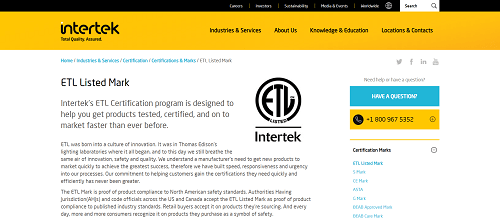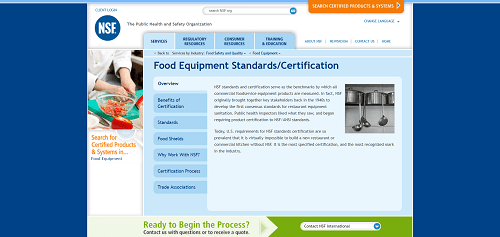With all of the food safety laws in place these days, food equipment manufacturers would be foolish to design a great piece of equipment without first putting it through a certification process. While it’s sometimes a pricey and time-intensive endeavor, it is one that gives much more flexibility to the restaurant and food producer clients using the equipment.
Let’s take a look at two of the most popular food equipment certifications that relate to both sanitation and safety. ETL and NSF marks are recognized nationwide – and, in some cases, worldwide – and act as universal symbols for public health.

ETL, short for Edison Testing Laboratories, is a food safety program and certification process that is part of the elite group of third-party food equipment testers, NRTL (Nationally Recognized Testing Laboratories). ETL is operated by Intertek, a laboratory that conducts all of the necessary testings. Currently, ETL tests against a number of state, federal, and even global food safety mandates for both operational safety, as well as sanitation.
There are various forms of the ETL mark, which can be chosen based upon the needs of the client, the design of the product, and/or the region in which it will operate. Intertek offers the ETL Sanitation certification for food processing equipment, as well as ETL Listed and Verified, broader marks which are meant to be more far-reaching. ETL marks are recognized everywhere in North America, and sometimes even abroad, depending upon the territory.
As with most other certification programs, applicants must provide plenty in the way of background information prior to being awarded a certification. Intertek asks for things like photos, design blueprints, and sometimes even prototypes. In order to get started on the certification process, the manufacturer must submit the paperwork to Intertek.
Applicants should also look at the current rates listing, one that varies heavily subject to the country. You can learn more about the various quarterly certification, set-up, and potential fees on the Intertek website.

Similar to ETL, the NSF certification is also one that is anchored in sanitation and safety for both restaurants and food processors. NSF International, short for National Sanitation Foundation International, is yet another NRTL that certifies food-safe equipment. In order to gain the most holistic insight into equipments’ efficacy and safety, NSF International tests materials, design, and performance.
Currently, a manufacturer can be awarded one of two NSF marks: the standard NSF International symbol (in blue) and the NSF/NSFC symbol (in black). Both symbols are designed to be used throughout North America, but the NSF/NSFC mark is more flexible in the sense that it also tests against ANSI (American National Standards Institute) guidelines.
In order to be awarded an NSF mark, the applicant must go through a seven-step process. According to NSF International, the process includes the following steps:
As you can see by the last point, once certification is issued, the NRTL has the right to reassess the plant annually for inspection and retesting. One-time and annual fees vary based on the number, size, and complexity of the equipment. The pricing will be assessed after the initial application has been processed.

As you’ve likely surmised by the information outlined above, ETL and NSF certifications have plenty in common with one another. For one, both Intertek (ETL’s parent company) and NSF International are NRTLs, meaning both labs have been federally distinguished as experts in the area of sanitation and safety as it corresponds to food equipment.
Additionally, in order for manufacturers to be granted the certifications, they must undergo rigorous application processes and sometimes high upfront investments to ensure that their products are on the road to getting certified.
But, distinctions and application processes aside, the number one way in which both are similar is that ETL and NSF standards are testing against one another within both certification processes. This means that all of the guidelines outlined in ETL are tested in the NSF testing process and vice-versa. It’s because of this that both marks, in most circumstances, are viewed as being virtually interchangeable.
So, which mark should you go with? It all depends on your specific needs, budget, and time constraints. Most prudent experts would advise you to shop around between the two to get a better sense of timeline and cost. Either way, your equipment will be provided with a mark that proves its efficacy and safety.
Whatever certification you obtain, choose a durable metal label from an authorized label supplier such as MPC. Metalphoto® photosensitive anodized aluminum labels offer the durability needed to withstand the typical food equipment operating environment to ensure that your labels remain readable throughout the lifespan of your equipment. Browse our full range of custom labels and tags to find the right label solution for your equipment.
Our sales engineers are experts in automatic asset tracking, tagging and identification,a nd can answer all your questions. Get in touch now.
Lets Talk ›